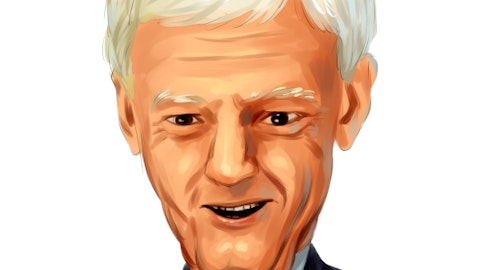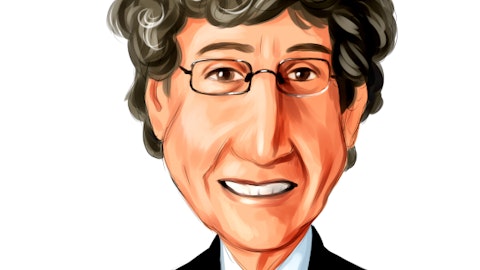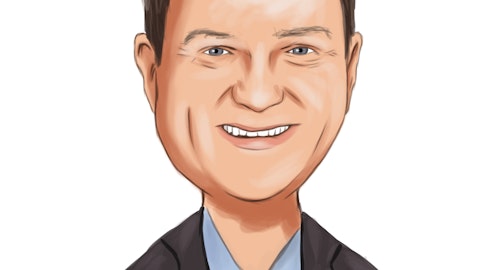Willdan Group, Inc. (NASDAQ:WLDN) Q4 2022 Earnings Call Transcript March 9, 2023
Operator: Greetings, and welcome to the Willdan Group Fourth Quarter and Full Year 2022 Financial Results Conference Call. . It is now my pleasure to introduce your host, Al Kaschalk of Investor Relations. Please proceed.
Al Kaschalk: Thank you, Latania. Good afternoon, everyone, and welcome to Willdan Group’s Fourth Quarter and Fiscal Year 2022 Earnings Call. Joining our call today are Tom Brisbin, Chairman of the Board and Chief Executive Officer; Kim Early, Chief Financial Officer; and Mike Bieber, President. The call today is built on our earnings release we issued after the market closed today. You may find the earnings release and the Willdan investor report that accompanies today’s call in the press release and Stock Information section of our Investor Relations website found at ir.willdan.com. Management will review prepared remarks, and we will then open the call up to your questions. Statements made in the course of today’s conference call, including answers to your questions, which are not purely historical, are forward-looking statements within the meaning of the Private Securities Litigation Reform Act of 1995.
The forward-looking statements involve certain risks and uncertainties, and it is important to note that the company’s future results could materially differ from those in any such forward-looking statements. Factors that could cause the actual results to differ materially and other risk factors are listed from time to time in the company’s SEC reports, including, but not limited to the annual report on Form 10-K filed for the year ended December 31, 2021. The company cautions investors not to place undue reliance on the forward-looking statements made during the course of this conference call. Willdan disclaims any obligation and does not undertake to update or revise any forward-looking statements made today. In addition to GAAP results, we’ll then also provide non-GAAP financial measures that we believe enhance investors’ ability to analyze the business trends and performance.
Our non-GAAP measures include net revenue, adjusted EBITDA and adjusted EPS. I’ll now turn the call over to Tom Brisbin, Willdan’s Chairman and CEO.
Thomas Brisbin: Thanks, Al, and good afternoon, everyone. We believe 2022 was the end of the negative headwinds associated with COVID and the start-up of the California IOU programs. As stated previously, we expected the second half of 2022 to show an upward trend and it did. The results reported for the fourth quarter were net revenue up 25%, profit up 52%, organic growth up 25%. We have begun our trend back to a growth company that we were before COVID. Let’s first talk about why we are optimistic about 2023. For the first time, since the 1970s, the U.S. federal government has passed legislation in energy to inject nearly $370 billion in the form of tax credits and loans to facilitate a faster clean energy transition via the Inflation Reduction Act.
This will result in trillions of dollars of new clean energy investments over the next decade and will have a direct and longer lasting impact on our fundamental lines of business. The beginning of this funding is industry sometime this quarter. To take full advantage of federal incentives, we are already consulting with utilities and cities on using these federal programs and are picking our utility programs to be able to stack federal and utility incentives together to make them more successful. Every state and utility are trying to maximize the amount of federal incentives for their customers. We have the successful engineering and financial services practice focused on cities. We are seeing a rapid growth in the number of cities that are also focused on maximizing benefits.
We have a unique opportunity to bring our energy and infrastructure business to benefit these customers. This natural synergy between our lines of business is all incremental to our base case forecast. We are fortunate that we have been positioned for this clean energy economy transition for several years and it appears that we are going in the right direction. There was an article about Willdan and a few days ago. And I talked to you of was very accurate and We did take these setbacks in 2020, ’21 and ’22, as stock loss greater than 60% of its market cap. With the momentum from the fourth quarter and our backlog, the next 3 years look very exciting for Willdan. Let me give you a few examples of how we are positioned for this transition. The following examples should demonstrate geography, capabilities and experience.
Our E3 business headquartered in San Francisco continues to grow at 20% plus. They provide high-end energy consulting in the entire country helping develop the framework for the clean energy transition. They have been and will continue to be Willdan in the future on where we move to the continued growth of Willdan. Our Energy business in the West is significant because it is primarily in California, which is aggressive on clean energy. For example, we have held the contract with LADWP for 11 years and 3 recompetes, certainly the largest municipal utility in the nation is an excellent credential. We also serve the 4 California IOUs in the quest to save energy and their transition to electrification. Specifically, we have amended the contract to continue with Southern California as we have mutually downsized the contracts by 65% or about $100 million per year to reduce the risk for both of us.
Through this amendment process, we have found a solution to the excessive ramp-up costs. It is fair to say that SCE’s approach to contracting was not anticipated by Willdan. We did not know about the significant adjudicatory matter that they were dealing with in their energy efficiency programs. That manner, which we were not part of has been settled, and we together with SCE are working on how to proceed with these programs going forward. We believe the new management at SCE’s Energy Efficiency Group had the desire to save electricity and look to new ways to reduce carbon. The California IOU contracts are now expected to be positive contributors rather than negative drags. With Pacific Gas & Electric, we are working on an all new construction for the state and the public sector EE and electrification — energy efficiency, I should say, and electrification in their territory.
For San Diego Gas & Electric, we were recently awarded an additional $11.6 million 1-year contract to support small businesses statewide that are recovering from COVID. This is a customer service program where KWH delivery is not required. It is a professional services contract. Our East Coast energy operations New York, Maryland, Pennsylvania, Massachusetts, the Carolinas are all well positioned for the next 3 to 5 years. For the first time ever in New York, most of the revenue is based on electrification measures, not energy efficiency. Lighting energy efficiency is now only 20% to 25% of revenue, down from 100% 5 years ago. During the 2020 through 2022 tough times, we did a lot of rightsizing and positioning. Industrial EE, energy efficiency, is positioned to be profitable going forward with private sector clients.
Our new Energy Engineering — our New York Energy Engineering won significant work in 2022. With this group, we expect 50% organic growth in 2023. We have the work with the Dormitory Authority of the State of New York, the New York City Housing Authority, the New York Power Authority and Warren. They have an excellent backlog and a plan for execution. Again, they are electrifying nitrogen housing as a way to decarbonize the grid and provide better living for the resident. Our performance engineering is back on track for ’23 and some exciting news that we can share in the near future. In addition, we have won 5 performance engineering contracts in California based on our relationships with the cities formed by our civil engineering group. Our software business also came out of 2022 with a clear picture for ’23.
Their pipelines looks good, and they will have news to share in the near future also. Positive news that is. Our engineering and financial services for cities Willdan for 2022, just like E3. They grew, they were profitable, and we expect the same in 2023. We expect these city relationships to really help us with the clean energy transition and future investments by the government. Cities are an important customer for us, and we have a 50-year long relationship in California. We’re seeing Energy as 1 more professional service that municipal governments will be buying. In summary, 2022 rewinds. We have solved the major issues and look forward to We are off to a good start based on the first 2 months of this year. I want to thank our employees for really doing a great job through some tough times.
Willdan has become more resilient again. I would also like to thank our shareholders for your understanding and patience. I will now turn the call over to Kim, who will provide additional details on our financial results and outlook.

Photo by Jason Blackeye on Unsplash
Creighton Early: Thanks, Tom, and good afternoon, everyone. Our Q4 performance reflected increasing momentum of gross revenue up by 23% and net revenue up 25% over the prior year. The numbers were driven by a surge in revenue under our California IOU programs as well as higher T&M revenues from energy planning services and our Engineering and Consulting segment. Gross profit also increased 24%, consistent with the revenue growth to $43.1 million for the quarter. As a percentage of gross revenue, gross profit margin increased 40 basis points, reflecting the change in the mix of revenues. Our revenues and gross profits were up more than 20%. G&A expenses grew at a significantly lower rate than revenue. Lower stock-based compensation partially offset higher wages and salaries, while interest expense increased to $2.1 million for the quarter on higher borrowing and higher average interest rates.
Our reported pretax income for Q4 was $2.2 million, up 350% from $480,000 a year ago. The net loss of $425,000 in 2022 compared to a net loss of $890,000 for Q4 of 2021. Adjusted EBITDA was up 25% to $11.8 million for the quarter. Adjusted earnings per share was $0.36 compared to 47% in Q4 of 2021 due to the lower tax benefit and a higher diluted share count. For the full year, gross revenue increased 21% and net revenue increased 12%. The significant increase in construction management activities was the primary factor behind the higher gross revenue and the differential in gross and net revenue growth rates. Such activities have a higher percentage of subcontracted services and material content, which lead to a much smaller net revenue increase.
2022 also reflects higher revenues from engineering and consulting, partially offset by lower software licensing and direct install revenue. Gross profit in 2022 increased 6% to $143.6 million for the year, with gross margin decreasing to 33.5% from 38.4% in 2021, primarily due to the greater mix of construction management business, along with lower software licensing revenue and the ramp-up costs under the California IOU programs. G&A costs increased to modest 4% year-over-year, again, with lower stock compensation, partially offsetting higher salaries and wages and higher computer-related expenses. Facility expenses have been reduced by 14% since the pandemic or 21% on a per capita basis. Interest expense increased $1.4 million to $5.3 million for the year due to increased borrowing and higher average interest rates.
While the pretax loss was reduced year-over-year by $952,000, even lower tax benefit resulted in the reported net loss for fiscal ’22 of $8.4 million, flat when compared to fiscal 2021. 2022’s adjusted EBITDA was $23.3 million compared to $27.5 million a year ago. Adjusted earnings per share was $0.88 in fiscal ’22 compared to $1.55 in 2021. From a balance sheet perspective, the $20 million drawdown of our term loan facility in Q1 financed a corresponding increase in working capital over the course of the year to support the growth in revenue. Higher working capital levels resulting from the fourth quarter ’22 surge in California IOU revenue will be converted to cash in the course of the first half of 2023, with a significant amount of this cash already received in Q1.
Our unrestricted cash balance was $8.8 million at the end of 2022, down $2.4 million from a year ago, with nothing outstanding under our line of credit. Looking ahead to fiscal 2023, we’re expecting net revenue growth between 7% and 9%. We estimate our full year effective tax rate will be approximately 27% and that the weighted average shares outstanding will be 13.7 million. Adjusted earnings per share is expected to be in the range of $1.24 to $1.32, and adjusted EBITDA in the range of $35 million to $39 million. Consistent with the historic nature of our business and the calibrated earnings model, we expect the year to start with a seasonally lower Q1 and to peak in the third quarter as we continue to ramp up our utility programs and we expand construction management activities to coincide with school closings and warmer weather.
The increased earnings and cash flow are expected to reduce our overall debt leverage below 2x the adjusted EBITDA level, assuming no acquisitions during the year. Operator, we’re now prepared to accept questions.
See also 13 Largest Gold Mines in the World and 25 Strongest Countries in Europe by Military Power.
Q&A Session
Follow Willdan Group Inc. (NASDAQ:WLDN)
Follow Willdan Group Inc. (NASDAQ:WLDN)
Receive real-time insider trading and news alerts
Operator: . Our first question comes from Craig Irwin with Roth.
Unidentified Analyst: It’s Andrew on for Craig. Just a quick 1 for me. You guys alluded to it in your comments. Can you just provide some more details on the Integra Analytics backlog. I know you guys have been optimistic of a few contracts being inked in the near future, but I understand it’s a long sales cycle. So any additional color there would be great.
Michael Bieber: Sure, Andrew. This is Mike. We did not think any of those deals in Q4. So the results were of new major software contracts. The pipeline of opportunities has never looked better. We submitted a number of proposals and are in a number of discussions with customers right now, and we’re optimistic that we’re going to have a very good first half of this year.
Operator: Our next question comes from Chip Moore with E.F. Hutton.
Chip Moore: Some — a lot of great insight on some of the positive momentum you’re seeing there in the prepared remarks. In — about guidance, maybe you can talk about visibility there. You touched on about sort of the progression moving through the year, but particularly as it relates to California IOU programs and particularly the SCE contract amendment. Help us with that. I guess it’s my first.
Thomas Brisbin: We’re trying to decide who should answer that question. Get a little bit more specific on what you want to know about SCE’s amendment.
Chip Moore: Any more detail you can provide on it. But really, what I was trying to get at was just around visibility on the guidance and conservatism potential for upside. You talked about the pipeline, I guess, for instance, what are you baking in on software deals, for example?
Michael Bieber: Yes. Chip, this is Mike. We have almost all of the work that we expect to contribute in 2023, either under contract or in firm backlog. It looks very good from that perspective. In addition, we continue to submit new proposals and see a number of new opportunities, which might provide us upside if we’re successful in winning those and starting to execute in the year. So that — from that perspective, it looks very good coming into 2023. And we’re carrying Q4’s momentum into, as Tom mentioned, that we’ve already seen it in the first months of this year. So that perspective, it looks good. We have been — we’ve tried to factor down significantly any contribution from software in the year. We have — I won’t say that we have completely factored out, but we’ve been very conservative with our estimates on new software licenses to contribute to guidance.
Having said that, the pipeline looks very strong for and we’re optimistic that even the first half of this year looks very good.
Chip Moore: Perfect. That’s very helpful color. Appreciate it, Mike. And then I guess my other question is more on the civil engineering side that’s been, I think, like you said, your rock very resilient. Curious there, I guess, 2 questions. First, any concerns on the broader macro environment and it seems like more — you’re seeing more opportunity related to energy transition and IRA funding. So curious about what you’re seeing there, sort of those synergies and any potential to maybe expand that business outside some of your traditional California markets given those tailwinds over time.
Thomas Brisbin: Yes. We have not seen the effect of whether or not we’re in a recession or a recession is coming yet. We ask ourselves every day, what will ’23 be. As I said, we haven’t seen it yet to offset, though, we are thinking just like you said, that this energy intersection at the cities of the IRA and our lines of business like with E3 does may if we do see a recession and effect on our civil engineering business may be offset by the ramp-up in energy. That’s what we’re talking amongst ourselves. That’s all I can tell you. I mean it’s an unknown at this point.




